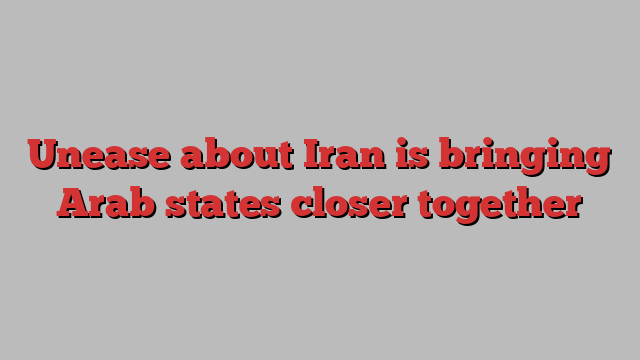
Unlock the Editor’s Digest for free
Roula Khalaf, Editor of the FT, selects her favourite stories in this weekly newsletter.
The writer is author of ‘Black Wave’, distinguished fellow at Columbia University’s Institute of Global Politics and an FT contributing editor
Iran and Israel’s repeated misreading of each other’s intentions and thresholds has led to yet another dangerous moment for the Middle East. First, Israel assumed, rightly, that Iran did not want all-out war. It expected wrongly, however, that after years of getting away with striking Iranian assets in Syria, targeting the Iranian consulate in Damascus earlier this month would not provoke a major response.
But after watching its proxies and assets repeatedly degraded in Syria and Lebanon since the start of the war in Gaza, Iran felt it had to draw a line, albeit in a highly choreographed and telegraphed way. There is no ignoring the deep fear that settled on Israel last weekend as a barrage of drones and missiles lit up the skies.
Israel’s counterstrikes against Iran early on Friday morning, though limited, were meant to signal clearly that it would not accept a repeat performance. Tehran, which still wants to avoid a wider conflict, has played down the significance of the strikes. The hope now is that the Israel-Iran enmity will retreat back into the shadows.
But Iran and Israel are also misreading their Arab neighbours.
The morning after Iran’s attack on Israel, a flurry of jokes and memes circulated on social media and messaging apps across the Arab world ridiculing Tehran’s move as a failure. One showed a missile launcher loaded with cucumbers with a play on the similarly-sounding Arabic words for cucumbers and options: all options (cucumbers) are on the table. Another video announced the arrival of Iran’s drones over Israel, as a sputtering red toy drone came into focus.
The Iranian regime has been desperate to repair its credibility in the Arab and Muslim world. No doubt there were those who were disappointed Iran didn’t inflict serious damage on Israel, but the jokes were telling as far as Tehran’s current standing in the region is concerned.
Hamas had expected Iran and Hizbollah would enter the war against Israel in full force. They have been waiting since October 8. Instead, Iran and its regional proxies have done the bare minimum to show support. Whether or not Hamas retained any hope that Tehran was willing to help them, it is clear now that the Iranian cavalry isn’t coming.
The US and Israel may think this all amounts to an opportunity to increase the pressure on Iran and ramp up regional security co-operation. Israel’s Prime Minister Benjamin Netanyahu wants to divert attention away from the disastrous war in Gaza and on to his favourite topic of the threat from the Islamic Republic.
His defence minister Yoav Gallant said this was an opportunity to form a strategic alliance against Iran with the US and “other countries” — presumably he was referring to Arab nations.
Unease about Iran’s arsenal and behaviour is bringing Arab states closer together, including those that have had recent spats, such as Saudi Arabia, the UAE and Qatar. There is deep concern in the Gulf about the impact of the Gaza war on Egypt, but also on Jordan, which has faced weeks of anti-Israel protests, many with a clear pro-Hamas bent.
Still pushing Arab countries to openly join an anti-Iran military coalition while again sidestepping the core issue of Palestinian rights would be a misreading of the regional military co-operation that helped thwart Iran’s shower of projectiles. The military co-ordination, led by the US, took place mostly under the Centcom umbrella into which Israel was integrated in 2021. This is not the start of a new era of open co-operation between Arab countries and Israel, as much as Israel would like to think so.
Jordan, the only country that publicly disclosed it had shot down Iranian drones, made clear this was about protecting its sovereignty and airspace. King Abdullah reportedly asked US President Joe Biden to make sure Israel doesn’t use Jordanian airspace for its counterstrikes against Iran.
The Saudis may be open to closer military co-operation under Centcom, which would mean de facto co-operation with Israel. But no one should expect the kingdom to engage in joint missions or military visits with Israel. This would only make the Saudis themselves a target of Iran’s missiles. The whole purpose of their rapprochement with Tehran in March last year was to ward off this threat.
This is also why the kingdom has been seeking security guarantees from the US. But the Biden administration has made any formal defence relationship conditional on the normalisation of ties between Saudi Arabia and Israel. Riyadh won’t proceed without a promise for what Saudi officials have repeatedly described as “a credible, irreversible path to a Palestinian state”. Washington knows this.
So far, Netanyahu has chosen to forgo the jackpot of ties with the Saudis rather than contemplate a Palestinian state and risk his political survival. But after Israel’s misreading of Iran over the past week, he will have to rethink that equation fast if he wants more military co-operation from Arab countries and their help for the day after in Gaza.